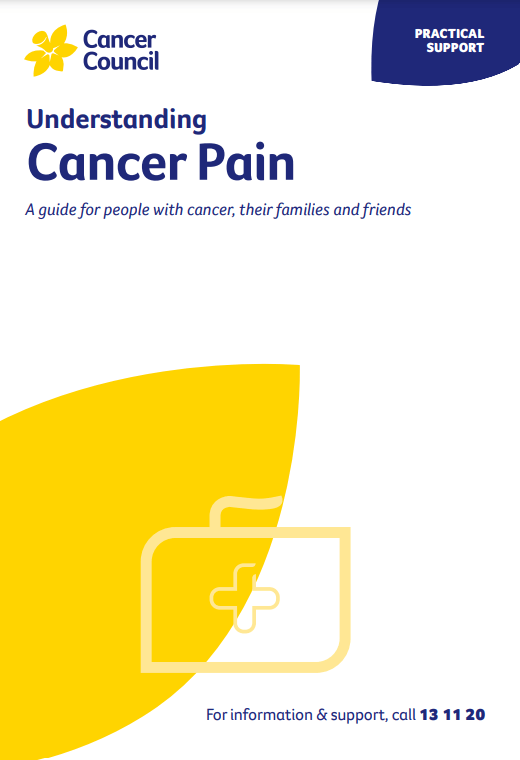Pain can have a big impact on your life and prevent you from doing the things you want to do. After treatment, pain may continue for months or years. This is called chronic pain and it affects some cancer survivors.
Learn more about:
Causes of pain
After cancer treatment, causes of ongoing pain include:
- scars or nerve damage after surgery
- nerve damage from cancer drug therapies leading to numbness and tingling in hands and feet (peripheral neuropathy)
- irritated, sensitive skin in the area where you had radiation therapy
- joint and muscle pain from hormone therapies
- a build-up of lymph fluid (lymphoedema).
How you manage your pain depends on the type of pain you have. Pain may be a side effect of cancer treatment or it may be caused by an unrelated health issue, such as arthritis.
Managing pain
Learning how to manage your pain may let you return to many of the activities you enjoy and improve your quality of life. Discuss your pain with your doctor so they can try to work out the cause and develop a pain management plan. In cases where no fixable cause of the pain is found, the focus will shift to improving your ability to function despite the pain.
Pain medicines called analgesics are widely used to help reduce pain. Non-steroidal anti-inflammatory drugs or paracetamol are the main drugs used to relieve pain in survivors. While opioids are sometimes prescribed for chronic pain, research shows that using opioids for a long time is not safe. There are other ways to relieve pain (see below).
If your pain is not well controlled, ask your doctor about referring you to a pain management specialist in a multidisciplinary pain clinic.
Ways to relieve pain
- Do some daily stretching and walking to help you deal with the pain. It is important to pace your activities throughout the day, and include rest or stretch breaks.
- See a physiotherapist or exercise physiologist. They can develop a program to improve muscle strength and increase your ability to function, which may help relieve pain.
- Talk to a physiotherapist or occupational therapist. They can suggest ways to address physical or practical problems that are causing pain.
- Learn different ways to think about the pain so it has less impact. Some types of talking therapies provided by psychologists and counsellors can help.
- Cognitive behaviour therapy (CBT) has been shown to improve mood, and decrease stress and anxiety.
- Try relaxation techniques, such as deep breathing, hypnotherapy, meditation or listening to music. They may improve how well other pain-relief methods work, help you sleep, and focus your attention on something other than the pain.
- Use massage or hot packs to relieve muscle spasms, stiffness and contractions. Cold packs may be used to numb the pain.
- Acupuncture may help by stimulating nerves to release the body’s natural chemicals, which help reduce pain.
- Try creative therapies such as art therapy or journal writing. These can help you express your feelings and work through the pain.
- Medicines that are normally used for other conditions can help relieve some types of chronic pain. They include antidepressants and steroids.
For more on this, see Pain and cancer.
Podcast: Managing Cancer Pain
Listen to more episodes from our podcast for people affected by cancer
More resources
Prof Michael Jefford, Medical Oncologist and Director, Australian Cancer Survivorship Centre, Peter MacCallum Cancer Centre, VIC; Lucy Bailey, Nurse Counsellor, Cancer Council Queensland; Philip Bullas, Consumer; Dr Kate Gunn, Clinical Psychologist and Senior Research Fellow, Department of Rural Health, University of South Australia, SA; Rosemerry Hodgkin, 13 11 20 Consultant, Cancer Council WA; Prof David Joske, Clinical Haematologist, Sir Charles Gairdner Hospital and Clinical Professor of Medicine, The University of Western Australia, WA; Kim Kerin-Ayres, Clinical Nurse Consultant, Cancer Survivorship, Concord Hospital, NSW; Sally Littlewood, Physiotherapist, Seymour Health, VIC; Georgina Lohse, Social Worker, GV Health,VIC; Melanie Moore, Exercise Physiologist and Clinical Supervisor, University of Canberra Cancer Wellness Clinic, ACT; June Savva, Senior Clinician Dietitian, Nutrition and Dietetics, Monash Cancer Centre, Monash Health, VIC; Dr Elysia Thornton-Benko, Specialist General Practitioner and Research Fellow, University of New South Wales, NSW; Prof Janette Vardy, Medical Oncologist, Concord Cancer Centre and Professor of Cancer Medicine, The University of Sydney, NSW; Lyndell Wills, Consumer.
View the Cancer Council NSW editorial policy.
View all publications or call 13 11 20 for free printed copies.
Need to talk?
Support services
Life after cancer treatment
Programs and support for people who have finished treatment
Cancer Council Online Community
A community forum – a safe place to share stories, get tips and connect with people who understand
Cancer information
Family and friends
A cancer diagnosis has a far-reaching impact, affecting not only the person with cancer, but also their family and friends.
Emotions and cancer
Learn about the different emotions you may experience after a cancer diagnosis

